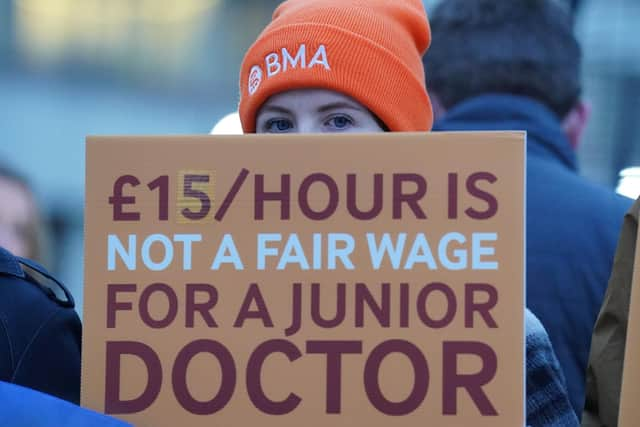See how many appointments were postponed in Wigan due to junior doctors' strike
and live on Freeview channel 276
The six-day walkout from January 3 to January 9 was the longest strike in NHS history, with the British Medical Association demanding a 35 per cent pay rise. The Government called this "not affordable".
NHS England figures show the strike resulted in more than 113,000 inpatient and outpatient appointments across England being postponed.
Advertisement
Hide AdAdvertisement
Hide Ad

Of these, 474 were at Wrightington, Wigan and Leigh NHS Foundation Trust, with Thursday January 4 seeing the highest number of postponed appointments, at 189.
NHS leaders warned the impact caused by the strike could last for months.
NHS England’s national medical director Prof Sir Stephen Powis said: "The longest strike in NHS history has led to unprecedented disruption for patients and their families, and while staff have planned extensively and worked tirelessly to keep patients safe, it comes once again with an enormous cost."
Sir Stephen said the figure is likely higher than the 113,000 recorded, with medical leaders and frontline staff concerned about rising flu cases and the cold weather causing increased hospitalisations.
Advertisement
Hide AdAdvertisement
Hide Ad"This puts an incredible strain on staff who have been covering striking colleagues as we continue to navigate one of the most difficult times of year," he added.
"Colleagues across the NHS will now be doing everything they can to make up for lost time as we continue to make progress on addressing the elective backlog and ensure patients get the care they need."
Sir Julian Hartley, chief executive of NHS Providers, urged the Government and unions to "sit down and talk to find a way to stop this dispute dragging on".
The figures also show an average of 96 junior doctors were on strike each day over the six-day period at WWL, with the walkout peaking on Thursday January 4 at 152.
Advertisement
Hide AdAdvertisement
Hide AdClaire Wannell, WWL’s interim chief operating officer, said: “The six days of industrial action, the longest in NHS history, were certainly challenging for WWL, and throughout the strike we continued to work with our partners across the Wigan borough to try to ensure minimum disruption to patient care and safety.
“Whilst we respect our junior doctors’ right to strike, unfortunately, the continued industrial action, which fell in the most challenging week for the NHS, had an impact upon planned and routine care. In preparation, and in line with hospitals across the country, WWL took the decision to postpone some non-urgent inpatient and outpatient appointments to maintain critical services and patient safety.
"This was not a decision taken lightly and urgent elective care such as some cancer operations and other time critical procedures continued to proceed. The trust only rescheduled appointments and procedures where necessary and appointments were rebooked immediately if possible.
“In line with our industrial action recovery plans, the same approach has been taken to respond to the impact that the strike had on our services.
Advertisement
Hide AdAdvertisement
Hide Ad"We have worked incredibly hard to make sure that the recent challenges we have faced have had minimal impact on our services and this remains one of our trust’s key priorities. We would like to thank those who have been waiting for appointments for their understanding and patience.”